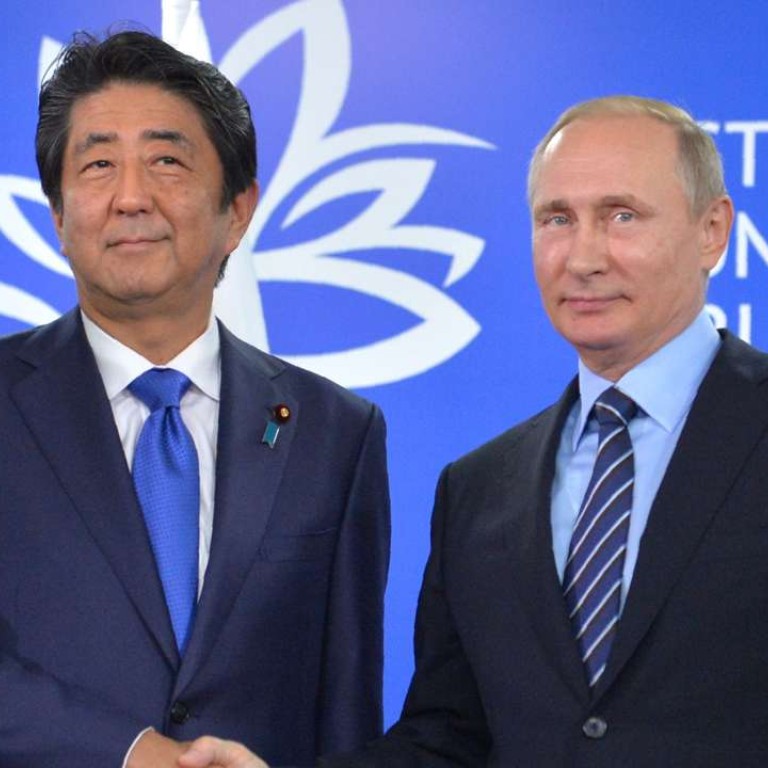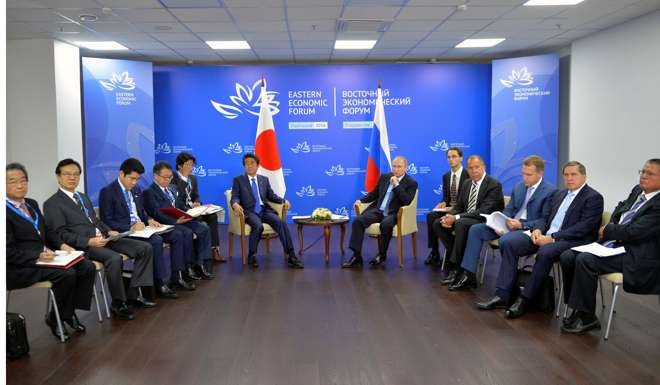
Japan, Russia to make proposals to end territorial row by year-end
The dispute stems from the Soviet Union’s decision, in the final days of the second world war, to seize the islands – known in Japan as the Northern Territories and in Russia as the Southern Kuriles
Russia’s President Vladimir Putin and Japan’s Prime Minister Shinzo Abe on Friday agreed to draw up proposals this year to end a row that has bedevilled their relationship for 80 years over a group of islands that lie between the two countries.
The dispute stems from the Soviet Union’s decision, in the final days of the second world war, to seize the islands – known in Japan as the Northern Territories and in Russia as the Southern Kuriles – that Tokyo says are its sovereign territory.
Moscow refuses to give the islands back.
Meeting on the sidelines of a business forum on Russia’s Pacific coast, the two leaders agreed that officials on both sides would keep working on a draft deal that Abe and Putin would consider when the Russian leader visits Japan in December.
We’re not talking about some exchange or some sale ... We don’t trade in territories, although the problem of a peace treaty with Japan is a key one
Though Russia and Japan have strong diplomatic and commercial ties, the dispute has prevented them signing a treaty formally ending their second world war hostilities.
“Particularly regarding a peace treaty, the two of us alone had quite an in-depth discussion,” Abe told reporters after meeting Putin in the port city of Vladivostok.
Abe said this encouraged him to believe that a resolution of the dispute, based on mutual trust, had become clearer.
Russian Foreign Minister Sergei Lavrov, who briefed reporters on the results of the talks, said he detected a new willingness from the Japanese government to find common ground.
“Of course the leaders discussed the issue of a peace treaty,” Lavrov said.
Referring to the preparatory work being carried out by officials, he said: “There was an agreement that we will continue these consultations and the results will be passed on during the visit of the Russian leader to Japan, which will take place ... before the end of the year.”

A deal on the islands would boost Japanese investment in Russia at a time when Moscow, battered by low global oil prices and Western sanctions, badly needs an injection of cash.
From Tokyo’s perspective, better relations would allow Russia and Japan to form a counterbalance to China, the region’s rising power.
However, any concessions by Putin on the islands would carry political risks for him, potentially hurting the image he has crafted for himself at home as a leader who stands up for Russian national interests in the face of outside aggression.
In an interview with Bloomberg news agency before he met Abe, Putin indicated he would not contemplate giving up territory.
“We’re not talking about some exchange or some sale,” Putin was quoted as saying. “We are talking about finding a solution where neither of the parties would feel defeated or a loser.”
“We don’t trade in territories, although the problem of a peace treaty with Japan is a key one,” he said, noting that Moscow was keen to work with Tokyo to resolve the problem.

